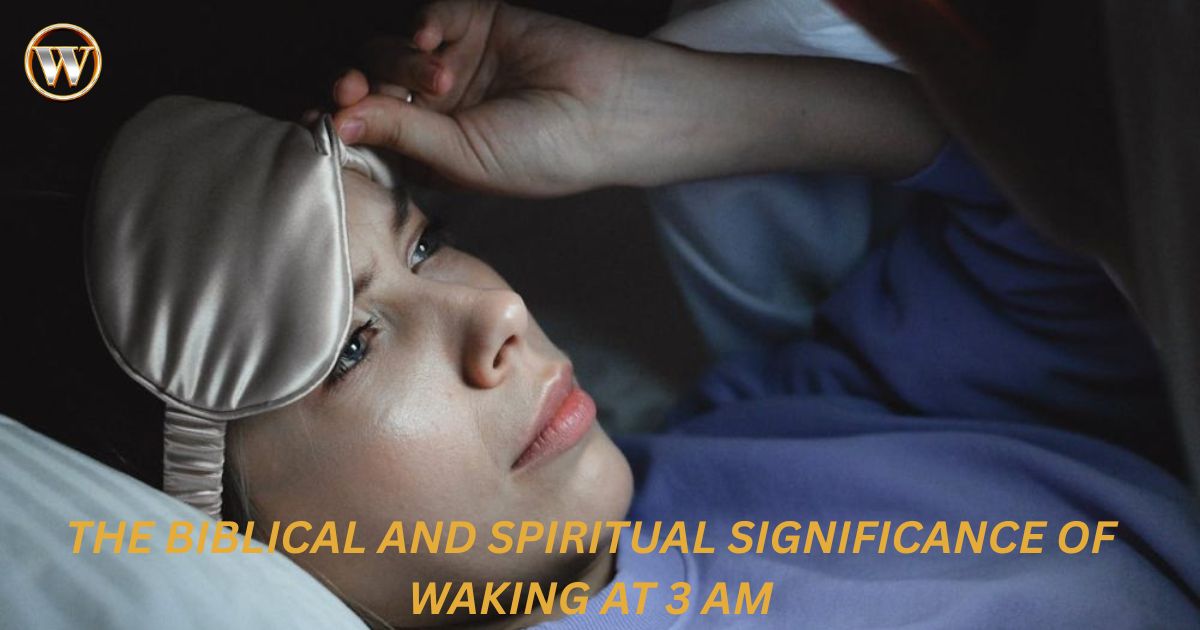Have you ever found yourself wide awake at 3 AM, wondering why your body clock seems to have a mind of its own? You are not alone. Many people experience this strange phenomenon. Often, it goes beyond just a quirk in our sleep patterns. For centuries, the biblical meaning of waking up at 3 AM has intrigued spiritual seekers and researchers alike.
This article explores this mysterious occurrence, looking at its spiritual implications, cultural context, and scientific explanations.
Historical and Cultural Context: Understanding the Roots Behind the Witching Hour
The Witching Hour: More Than Just a Spooky Tale of Supernatural Beliefs
The concept of the “witching hour” has been part of folklore and cultural traditions for many generations. This period, typically between 3 AM and 4 AM, is shrouded in mystery and superstition across many cultures.
- In Western folklore, it is believed to be a time when supernatural creatures are most active, including witches and ghosts.
- Many traditions view this hour as a time when the veil between the physical and spiritual worlds becomes thin, allowing easier communication with spirits.
- Historically, this hour was thought to be when witches would gather to perform rituals, causing fear and fascination in society.
The Devil’s Hour: A Christian Perspective on Spiritual Darkness and Light
In Christian tradition, 3 AM is sometimes referred to as the “devil’s hour.” This belief arises from the idea that it is the opposite of 3 PM, the hour when Jesus is said to have died on the cross. However, this interpretation is not universally accepted in Christianity.
“The devil’s hour is just another opportunity for God’s light to shine brighter.” – Unknown
While some view it as a time of evil, many believe it can also be a time of reflection and prayer.
Cross-Cultural Perspectives on 3 AM: Global Insights into This Mysterious Hour
The significance of 3 AM is not limited to Western or Christian traditions. Many cultures around the world attach special meanings to this time:
- In Chinese medicine, 3-5 AM is linked to the lungs and the process of letting go of grief. It’s believed that waking during this time can signify the need to release emotional burdens.
- Some Native American traditions see this hour as a period of heightened spiritual activity, where communication with ancestors is possible.
- In Hinduism, the hours between 3-6 AM (known as Brahma Muhurta) are considered ideal for spiritual practices, meditation, and prayers, as this time is thought to be spiritually potent.
Biblical Significance of 3 AM: Exploring Scriptural Connections
Jesus’ Crucifixion and the Ninth Hour: Mirroring Times of Suffering and Redemption
In the Bible, the ninth hour (around 3 PM) is mentioned as the time of Jesus’ death on the cross. While this does not directly relate to 3 AM, some draw connections between these mirroring times. The idea of suffering at one hour and potential redemption at another is a theme that resonates with many believers.
Peter’s Vision in Acts 10: A Divine Encounter in Prayer
The Book of Acts recounts Peter having a significant vision at the ninth hour of prayer, around 3 PM. This has led some to speculate about the spiritual significance of the corresponding AM hour. The connection between prayer and divine revelations at specific times is a profound theme in biblical texts.
God’s Call to Samuel: A Young Prophet’s Nighttime Encounter
In 1 Samuel 3, we read about God calling to the young Samuel in the night. While the exact time isn’t specified, this story often connects to early morning hours and divine communication. Samuel’s willingness to listen serves as a reminder of the importance of being receptive to divine messages.
The Significance of “Watch” Periods in the Bible: Spiritual Awareness Through the Night
The Bible often mentions different “watches” of the night, which were used to divide time. Understanding these watches can help us appreciate the spiritual significance attributed to different times:
- First Watch (6 PM – 9 PM): A time of reflection on the day.
- Second Watch (9 PM – Midnight): A period of rest and introspection.
- Third Watch (Midnight – 3 AM): Often seen as a time of spiritual struggle or prayer.
- Fourth Watch (3 AM – 6 AM): The transition period where new beginnings are possible.
The transition from the third to the fourth watch at 3 AM has been seen by many as spiritually significant, symbolizing a time of awakening.
Spiritual Interpretations: Insights into Divine Communication and Awareness
Divine Communication and Awareness: A Call to Spiritual Awakening
Many people on a spiritual journey interpret waking at 3 AM as a form of divine call or spiritual prompt. It is believed to be a time when spiritual awareness is heightened, making us more receptive to messages from the divine. This heightened awareness can lead to profound insights and personal growth.
Heightened Spiritual Sensitivity: The Quiet Hours of the Morning
The quiet of the early morning hours is often associated with increased spiritual sensitivity. This belief encourages many to use this time for prayer and meditation, seeking deeper connections and mystical insights. Engaging in spiritual practices during these hours can enhance one’s sense of peace and purpose.
The Power of the Number 3 in Spirituality: Significance Across Traditions
The number 3 holds significant meaning in various spiritual traditions:
- Christianity: Represents the Holy Trinity (Father, Son, Holy Spirit), emphasizing the importance of unity and connection.
- Mind, Body, Spirit Connection: Reflects the triad of human existence, reminding us of our holistic nature.
- Past, Present, Future: Symbolizes the three aspects of time, encouraging reflection on our life journey.
This numerical significance adds another layer to the spiritual importance of 3 AM, making it a time to reflect on our spiritual path.
Scientific Explanations for 3 AM Awakenings: Understanding the Sleep Cycle
While spiritual interpretations are compelling, science offers explanations for why we might wake up at 3 AM.
Circadian Rhythm Disruptions: The Body’s Internal Clock
Our body clock, or circadian rhythm, plays a crucial role in our sleep patterns. Disruptions to this internal clock can lead to unexpected awakenings. These disruptions can stem from various factors, including:
- Light exposure: Bright lights can signal the brain to wake up.
- Meal timing: Eating late can disturb sleep.
- Exercise schedules: Intense workouts before bed can affect sleep quality.
- Stress levels: High stress can lead to insomnia or early awakenings.
- Travel across time zones: Jet lag can confuse your body clock.
Sleep Cycles and REM Sleep: Understanding the Stages of Sleep
Our sleep consists of several cycles, each lasting about 90-110 minutes. If we wake during a lighter stage of sleep, which often occurs around 3 AM, we are more likely to remember it. Understanding these cycles can help us appreciate why waking at this time feels so vivid.
Hormonal Fluctuations: The Role of Cortisol and Melatonin
- Cortisol Levels: Cortisol, often called the “stress hormone,” naturally rises in the early morning, contributing to waking.
- Melatonin Production: Melatonin, the hormone that regulates our sleep-wake cycle, begins to decrease in the early morning, leading to lighter sleep and potential awakenings.
Environmental Factors: External Influences on Sleep Quality
- Temperature Changes: Our body temperature naturally drops during sleep and begins to rise again in the early morning, which can disturb sleep.
- Noise Disturbances: Even subtle noises can become more noticeable in the quiet of the night, causing awakenings.
Psychological Perspectives: The Mind’s Role in Sleep Patterns
Anxiety and Stress-Related Awakenings: The Impact of Mental Health
Stress and anxiety can significantly impact our sleep patterns. Waking at 3 AM might be your mind’s way of processing unresolved issues or concerns. Recognizing this connection can help address underlying anxieties.
Subconscious Processing During Sleep: The Brain at Work
Our brains continue to work while we sleep, sorting through information and emotions. This subconscious processing can lead to awakenings, especially during periods of heightened stress or significant life changes.
The Impact of Beliefs on Sleep Patterns: Shaping Our Experiences
Interestingly, our beliefs about sleep can influence our sleep patterns. If you believe that waking at 3 AM is spiritually significant, you might be more likely to notice when it happens. Embracing this belief can lead to deeper reflections during these awakenings.
Practical Approaches to 3 AM Awakenings: Navigating Nocturnal Experiences
Whether you view these awakenings as a spiritual call or a quirk of your sleep cycle, there are constructive ways to approach them.
Mindfulness and Meditation Techniques: Finding Calm in the Night
- Practice deep breathing exercises: This can help calm your mind and body.
- Try a body scan meditation: This relaxation technique focuses on different body parts, promoting peace.
- Focus on gratitude: Shifting your mindset towards positive thoughts can enhance your experience.
Prayer and Spiritual Practices: Using the Time for Reflection
If you lean towards spiritual interpretations, consider using this time for prayer or spiritual reflection. Many find this a peaceful and enriching way to spend these quiet hours.
Sleep Hygiene Improvements: Creating a Restful Environment
- Maintain a consistent sleep schedule: Go to bed and wake up at the same time each day.
- Create a relaxing bedtime routine: Engage in calming activities before bed, like reading or listening to soft music.
- Limit screen time before bed: Reducing exposure to screens can help improve sleep quality.
- Ensure your sleeping environment is comfortable: A cool, dark, and quiet room promotes better sleep.
When to Seek Professional Help: Recognizing the Need for Support
If frequent 3 AM awakenings disrupt your daily life or cause distress, consider consulting a healthcare professional or sleep specialist. They can provide guidance and support tailored to your needs.
Embracing the 3 AM Experience: Transforming Awakenings into Opportunities
Journaling and Self-Reflection: Capturing Insights in the Night
Keep a journal by your bed to record thoughts, dreams, or insights that come to you during these early morning hours. Reflecting on these moments can lead to personal growth.
Creative Inspiration and Problem-Solving: Harnessing the Quiet Hours
Many artists and thinkers find the quiet hours of the night particularly conducive to creativity and problem-solving. Use this time to brainstorm ideas or develop new projects.
Deepening Spiritual Connection: Strengthening Your Practice
For those on a spiritual journey, these moments can be opportunities for deepening your practice and connection. Consider incorporating rituals or meditative practices during these hours.
Conclusion: The Personal Significance of Waking at 3 AM
The biblical meaning of waking up at 3 AM and its spiritual significance intertwines faith, culture, and science. Whether you see it as a divine call, a quirk of your body clock, or something in between, these early morning awakenings can serve as opportunities for growth, reflection, and deeper understanding.
As we have explored, interpretations of this phenomenon are varied and fascinating. From the witching hour of folklore to scientific explanations of our sleep cycles, 3 AM holds a unique place in our collective consciousness.
Ultimately, the meaning you assign to these experiences is deeply personal. Whether you use this time for prayer and meditation, creative pursuits, or simply return to sleep, understanding the various perspectives can enrich your approach to these nocturnal awakenings.
Remember, while exploring the spiritual implications of waking at 3 AM can be enlightening, it is also important to prioritize your overall health and well-being. If these awakenings cause distress or disrupt your daily life, do not hesitate to seek professional advice.
As you continue your spiritual journey, may you find peace and insight in the quiet hours of the night, leading to greater understanding and inner peace.
FAQs: Common Questions About Waking at 3 AM
Q: Is waking at 3 AM always spiritual?
A: Not necessarily. While some attribute spiritual significance to waking at 3 AM, it can also be due to various physical, environmental, or psychological factors.
Q: How can I tell if it’s a spiritual awakening or just insomnia?
A: This often comes down to personal interpretation. If you feel a sense of peace or insight during these awakenings, you might lean towards a spiritual interpretation.
Q: Are there health risks associated with frequent 3 AM awakenings?
A: Frequent sleep disruptions can potentially impact your overall health and well-being. If you’re concerned, it’s best to consult with a healthcare professional.
Q: Can I train myself to wake up at 3 AM for spiritual practices?
A: While it’s possible to adjust your sleep schedule, it’s generally not recommended to intentionally disrupt your natural sleep patterns.
Q: What should I do if I’m scared when I wake up at 3 AM?
A: Focus on calming techniques like deep breathing or positive affirmations. If fear is a recurring issue, it might be helpful to speak with a counselor or therapist to address underlying anxieties.
Must Read:











